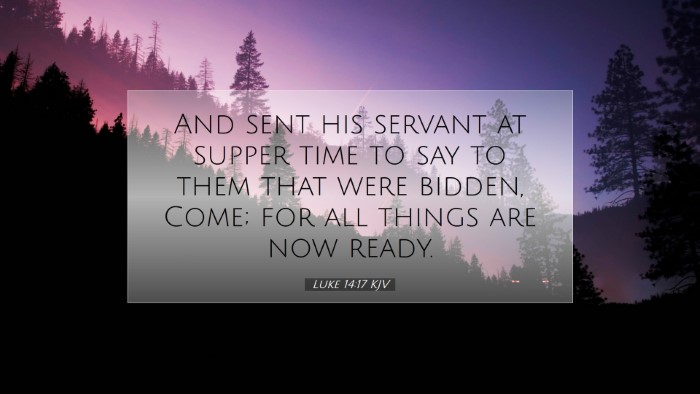Commentary on Luke 14:17
Verse: "And sent his servant at supper time to say to them that were bidden, Come; for all things are now ready."
Introduction
This verse is a critical component of the Parable of the Great Banquet, where Jesus illustrates the nature of the Kingdom of God and the response of its invitees. The verse opens with the depiction of a master sending a servant to invite those who had already been invited to the banquet, which serves as an analogy for God's invitation to salvation and fellowship.
Contextual Analysis
In this parable, Jesus is addressing the Pharisees and scholars of the Law, challenging their complacency and pride. It is important to recognize the cultural norms surrounding banquets in ancient Jewish society, where being invited signified status, community, and honor.
Invitation and Urgency
Matthew Henry emphasizes the invitation's urgency, signifying the readiness of God’s grace and the expectation of a response. The time specified as "supper time" indicates the culmination of preparation and the importance of responding promptly to God's call.
The Role of the Servant
The servant in this parable symbolizes the prophets and ultimately Christ Himself, who calls people to the feast. Albert Barnes notes that the servant's role is significant; his duty is to relay the master's command to those invited, metaphorically representing how God communicates His invitations through His messengers.
Theological Implications
This verse carries profound theological implications regarding God's sovereign grace. Adam Clarke comments that the readiness of the banquet reflects the completed work of Christ and the full provision of salvation offered freely to all. The verse underscores the completeness of provision in Christ, urging recipients to respond.
Responses to the Invitation
In subsequent verses, the responses from the invited are crucial. They illustrate human tendencies to prioritize worldly concerns over spiritual invitations. The parable calls attention to the excuses made by the invited guests and serves as a criticism of their indifference.
Exclusivity and Inclusivity
This passage highlights the tension between the exclusivity of the invitation and the inclusivity of the banquet. While the initial guests represent Israel, the later guests signify the invitation extended to Gentiles and the marginalized. This theme is prevalent in Luke's writings, demonstrating God’s desire for inclusivity in His Kingdom.
Practical Application
For pastors and theologians, this verse invites profound reflection on the invitation we extend to others. It challenges believers to examine their own responses to God’s call and how they relay that call to others in their communities.
Calling to Action
Pastoral application includes the importance of being proactive in extending the message of the Gospel, much like the servant in the parable. This involves not just preaching but engaging with individuals who may make excuses or delay in their responses.
Spiritual Readiness
The readiness of the "all things" prepared speaks to the urgency and completeness of the Gospel message. Believers are encouraged to maintain spiritual readiness in their lives, being aware that daily decisions reflect their availability for God's service.
Conclusion
Luke 14:17 serves not only as a reminder of God's gracious invitation but also challenges us to consider our own openness to His calling. The imagery of a banquet illustrates the joyous fellowship that awaits those who respond to God’s invitation. Each believer is called to participate actively in this divine banquet, both for their nourishment and as an act of witness to a world in need of grace.


